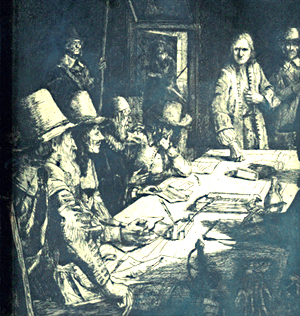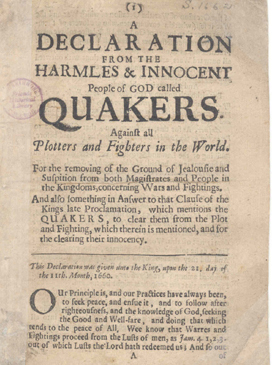From its beginnings in mid-seventeenth
century
England
,
members of the Religious Society of Friends (Quakers) have upheld a peace
testimony. This witness was a logical
consequence of early Quakers' belief that there is an absolute and unreconcilable
contradiction between the making of war and the "spirit and doctrine
of Christ." (2). Quakers were not only to refrain
from fighting in any war, but enjoined toward living their lives as peacemakers. Friends have affirmed that "our witness is not narrow and negative
but far-reaching in its scope and intensely positive in the active service
for Christ's peaceable Kingdom to which it calls us."(3). Friends have suffered death, imprisonment,
and confiscation of property for their refusal to support war.
The peace testimony cannot be separated from other social testimonies
of the Friends. As George Fox wrote
in 1650, Friends were called to live "in the virtue of that life and power
that took away the occasion of all wars." (4) Quakers were at the forefront of the antislavery
and female suffrage movements; they have relieved suffering on battlefronts
and in war-torn areas; they have turned public opinion toward more humane
treatment of prisoners and people with mental handicaps. Quaker relief of suffering during war and its
aftermath was recognized by the awarding of the Nobel Peace Prize to the [British]
Friends' Service Council and the American Friends Service Committee in 1947.
In wartime and in peacetime,
Quakers have led the way in demonstrating nonviolent methods of conflict resolution
in interpersonal and international affairs. They have advocated quiet diplomacy
and gestures toward reconciliation. John Haynes Holmes, who was not a Quaker, expressed the opinion
of many who have found the Society of Friends to be an island of conscience
and humanity in the most troubling times. "Friends...through three hundred years have borne witness to the inner
spirit and its imperatives of duty. Through
sheer fidelity to their faith, and a 'heart for any fate' of suffering and
even of death, they have won the reverence and therewith the confidence of
mankind. Armed not to kill, but to
serve and save, they cross every frontier, dwell among every people, enemy
and friend alike, and by their selflessness and triumphant lives they commend
the way of peace to men who cannot understand but must believe." (5).
1. George Fox and others, A Declaration From the Harmles & Innocent
People of God Called Quakers, presented to Charles II of
England
, 1660. (See cover image below).
2. Robert Barclay,
Apology (1676), Proposition 15, section 13.
3. Christianity and War,
London
Yearly Meeting, 1900, p. 8.
4. Journal of George Fox. 8th ed.
London
: Friends' Tract Association, 1891, vol. 1, p. 11.
5. John Haynes Holmes, Out of Darkness,
New York
: Harper, 1942, p. 134-135.

